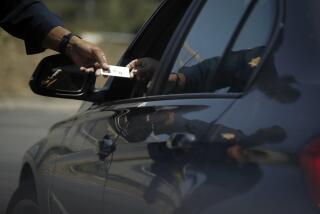Editorial: California law on racist 911 calls sends a good message — but will do more harm than good

Smartphone videos have given society at large an on-the-ground view of the racism that Black Americans and other people of color are subjected to on an ongoing basis. Sometimes it’s the everyday racism of people being told to “go back home.” Other times, it’s the horror of police brutality that has targeted Black people in particular.
In recent months, the videos have recorded white people calling police, falsely claiming that people of color, almost always Black, are breaking the law when they are birdwatching, entering an apartment complex where they live, or sitting on a park bench in an upscale neighborhood.
These have been ugly moments, shocking to many but not to Black people, who are sadly familiar with it. And although these incidents may seem more dismaying than dangerous, Black people know that if police come looking for them, especially after a 911 caller has accused them of threats or assault, the result could be a hostile interaction ending in arrest, injury or death, regardless of whether they have done anything wrong. Sometimes the police are summoned even when the accusers are the ones breaking the law, as in the case of the dog walker in New York’s Central Park who called 911 twice on a Black male birdwatcher who had simply asked her to put her pooch on a leash, as the law requires.
It’s natural for lawmakers to want to do something about these outrage-stirring situations, but such reflexive legislative one-offs, whether in response to headline news or viral videos, seldom solve anything and often carry unintended consequences. Yet California did it again this year with Assembly Bill 1775, signed into law last month by Gov. Gavin Newsom, which turns these false police reports into hate crimes and ups the punishment for them.
Filing a false police report is already against the law. The problem is that law enforcement in California seldom goes after the offenders. Police don’t want to discourage people from calling if they see something amiss. Still, that’s no reason to give a free pass to obvious fictions that harm innocent people.
AB 1775, authored by Assembly member Reggie Jones-Sawyer (D-Los Angeles), doesn’t address the main problem, which is the need for better enforcement of the existing law. Nor is it likely to deter people who either don’t realize how racist their police calls are or who are so fired up by their own sense of righteous indignation that they will forge ahead regardless.
Instead, it takes California in the opposite direction from where it’s been headed, by unnecessarily criminalizing actions that have been considered infractions up until now. It also opens a pathway to lawsuits from people who feel they have been unfairly targeted by false police reports.
It affects only 911 calls, not non-emergency calls. Although that makes sense ― the most dangerous situations are the ones that seem urgent and threatening ― many if not most of the frivolous calls aren’t made to 911. They’re often petty calls, such as the San Francisco woman who called police to ask whether a little girl had a right to sell bottled water on the sidewalk without a license.
The law toughens the consequences for all types of false 911 reports but adds on more penalties for reports that have targeted someone in a protected class, which raises constitutional questions about whether it infringes on freedom of speech. Most hate speech, ugly as it is, is covered by the 1st Amendment.
San Francisco is on the verge of passing its own version of the law, torturously called the CAREN Act, for “Caution Against Racially Exploitative Non-Emergencies” ― a lame nod to the meme of “Karens,” white women who make these sorts of calls. It shouldn’t bother.
Reaching into the minds of 911 callers to find out if their false reports were racially motivated opens up thorny legal complications, forcing courts to decide whether callers knew their reports were false and were motivated by animus against a particular group of people. It’s rare to have cases as blatant as the one from Central Park, where a video showed the white woman explicitly bringing up the birdwatcher’s race and threatening to use it in her call to police while he sat calmly recording her.
The new law serves as a symbol of support for harassed people of color, but on a practical and criminal justice front, it probably will do more harm than good. It is less likely to bring racists to justice than it is to make well-intentioned people feel afraid to make a 911 call in unclear but dangerous-looking circumstances, lest they open themselves to misdemeanor charges and a lawsuit. And that reticence could have tragic results.
More to Read
A cure for the common opinion
Get thought-provoking perspectives with our weekly newsletter.
You may occasionally receive promotional content from the Los Angeles Times.






